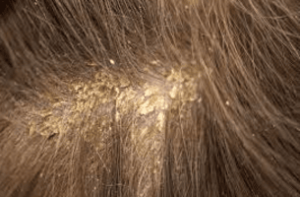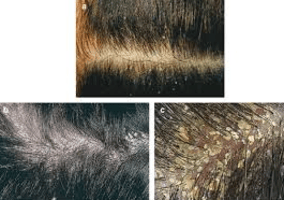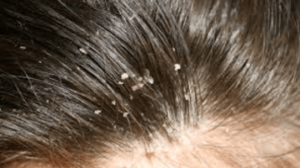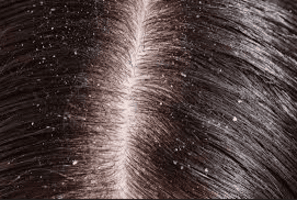Have you ever noticed white flakes dusting your shoulders and wondered if your dandruff might spread to others? It’s a common concern that many people have. When we see conditions that affect our skin or scalp, it’s natural to worry about whether they can be passed from person to person. Let’s clear up this confusion once and for all: is dandruff contagious?
In this comprehensive guide, we’ll explore everything you need to know about dandruff, including its causes, symptoms, and effective treatment options. Whether you’re dealing with dandruff yourself or just curious about those mysterious white flakes, this article will help you understand the facts behind this widespread condition.

What Is Dandruff?
The hallmark of dandruff, a common scalp ailment is the flaking of Dead skin cells from the head. While it’s normal for skin cells to die and flake off, dandruff occurs when this process accelerates, causing visible white or grayish flakes that often fall onto your shoulders, especially when wearing dark clothing.
The condition is incredibly common – affecting approximately 50% of adults worldwide at some point in their lives. Despite its prevalence, dandruff remains a source of embarrassment and confusion for many people, particularly regarding whether it can spread from one person to another.
Is Dandruff Contagious?
Let’s address the main question directly: Is dandruff contagious? The quick answer is, no! dandruff is not contagious. You cannot ‘catch’ dandruff from another person through physical contact, sharing personal items, or any other form of interaction.
Dandruff is not caused by a communicable pathogen like a virus or bacteria that can spread from person to person. Rather, it stems from a combination of factors including your own skin cell turnover rate, scalp oil production, sensitivity to certain fungi that naturally live on the scalp, and individual skin conditions.
The misconception about dandruff being contagious likely stems from confusion with other scalp conditions that can be transmitted, such as ringworm or head lice. Unlike these conditions, dandruff is a non-infectious condition related to your own body’s processes.
What Causes Dandruff?
Understanding the root causes of dandruff helps clarify why it isn’t contagious. Dandruff can occur due to a number of conditions, including:
Malassezia fungi:
These naturally occurring yeasts live on most adult scalps without causing problems. However, for some individuals, these fungi can irritate the scalp and accelerate skin cell turnover.
Seborrheic dermatitis:
This inflammatory skin condition affects oil-rich areas including the scalp, face, and upper chest, causing redness, itching, and flaking.
Dry skin:
Simple dry skin can cause flaking, especially during winter months when indoor heating systems reduce humidity.
Sensitivity to hair products:
Certain shampoos, conditioners, hair sprays, gels, and dyes can irritate the scalp and trigger dandruff in sensitive individuals.
Skin conditions:
People with certain skin conditions like psoriasis, eczema, or contact dermatitis may experience dandruff-like symptoms.
Diet and lifestyle:
Poor nutrition, stress, and certain health conditions can potentially contribute to dandruff development.
Hormonal factors:
Fluctuations in hormones can affect oil production on the scalp, potentially leading to dandruff. Since these factors are specific to each individual’s biology and environment, dandruff cannot spread from one person to another, reinforcing the fact that dandruff is not contagious.
Symptoms of Dandruff
Recognizing the symptoms of dandruff can help you differentiate it from other scalp conditions. Here are the common signs:
Visible white or grayish flakes:
The most obvious sign of dandruff is the appearance of small, white or grayish flakes on your scalp, hair, and shoulders.
Itchy scalp:
Many people with dandruff experience persistent itching, which can range from mild to severe.
Scaly, red patches:
In more severe cases, particularly when dandruff is caused by seborrheic dermatitis, you might notice red, scaly patches on your scalp.
Oily scalp areas:
Dandruff often occurs alongside oily patches on the scalp, particularly around the hairline and behind the ears.
Mild to moderate discomfort:
The itching associated with dandruff can cause discomfort, especially when scratching aggravates the condition.
 Types of Dandruff
Types of Dandruff
Not all dandruff is the same. Understanding the different types can help you identify the most effective treatment approach:
Dry skin dandruff:
Characterized by smaller, drier flakes, this type is often worse during winter months and in low-humidity environments.
Oily dandruff:
Typically associated with seborrheic dermatitis, this type produces larger, yellower, oilier flakes and may cause redness and irritation.
Fungal dandruff:
Caused by an overgrowth of Malassezia fungi, this type often responds well to anti-fungal treatments.
Product-induced dandruff:
Resulting from sensitivity to hair care products, this type usually resolves when the offending product is identified and eliminated.
Medical condition-related dandruff: Sometimes dandruff symptoms appear as a result of underlying health conditions like psoriasis or eczema.
Effective Treatments for Dandruff
Since dandruff is not contagious, managing it focuses on treating your own scalp rather than preventing transmission. Here are effective strategies for controlling dandruff:
Anti-dandruff shampoos:
These specialized products contain active ingredients designed to address different causes of dandruff:
- Zinc pyrithione: Helps reduce the Malassezia fungi on your scalp
- Selenium sulfide: Slows skin cell turnover and has antifungal properties
- Ketoconazole: A powerful antifungal that can effectively treat severe cases
- Coal tar: Slows skin cell death and has anti-inflammatory properties
- Salicylic acid: Helps eliminate scaling and promotes exfoliation
Regular shampooing:
For many people with mild dandruff, simply washing their hair regularly with a gentle shampoo can help control flaking.
Scalp care routine:
Developing a consistent scalp care routine can make a significant difference in managing dandruff. This might include exfoliating treatments and moisturizing scalp masks.
Dietary adjustments:
Some people find that increasing their intake of certain nutrients, particularly zinc, B vitamins, and omega-3 fatty acids, helps reduce dandruff symptoms.
Stress management:
Since stress can trigger or worsen dandruff for some people, incorporating stress-reduction techniques may help manage symptoms.
Sun exposure:
Moderate, safe sun exposure may help improve dandruff for some individuals. The UV light can slow skin cell turnover and reduce Malassezia populations.
Medical treatment:
For severe or persistent dandruff, consulting a dermatologist may be necessary. They can prescribe stronger medications or identify underlying conditions.

Prevention Tips
While dandruff isn’t contagious, preventing its development or recurrence is still important. Here are some preventive measures:
Choose hair products carefully:
Opt for gentle, fragrance-free products if you’re sensitive to certain ingredients.
Maintain a healthy diet:
Ensure adequate intake of zinc, B vitamins, and healthy fats to support scalp health.
Manage stress levels:
Practice relaxation techniques like meditation, deep breathing, or yoga to reduce stress that might trigger dandruff.
Avoid hot showers:
Very hot water can irritate the scalp and strip away natural oils, potentially worsening dandruff.
Limit styling products:
Excessive use of hairsprays, gels, and other styling products can build up on the scalp and contribute to dandruff.
Regular scalp massage:
Gently massaging your scalp can improve circulation and help remove dead skin cells before they become visible flakes.
When to See a Doctor
While dandruff is not contagious and usually manageable with over-the-counter products and home remedies, certain situations warrant professional attention:
Severe or persistent dandruff:
If over-the-counter treatments don’t improve your symptoms after several weeks.
Extreme redness or swelling:
These could indicate an infection or more serious skin condition.
Severe itching or pain:
Intense discomfort might suggest something other than common dandruff.
Spreading beyond the scalp:
If flaking and redness spread to your face, ears, or other body parts, it could be seborrheic dermatitis or another condition.
Sudden onset with other symptoms:
If dandruff appears suddenly alongside other health changes, consult a healthcare provider. A dermatologist can accurately diagnose the cause of your scalp issues and recommend appropriate treatments, which might include prescription-strength options.
Common Misconceptions About Dandruff
There are several myths surrounding dandruff that contribute to confusion about whether it’s contagious. Let’s clarify some common misconceptions:
Myth: Dandruff is caused by poor hygiene Reality
While infrequent shampooing can make dandruff more visible, the condition is not caused by poor hygiene. Even people with excellent hygiene habits can develop dandruff.
Myth: Dandruff is just dry skin Reality
While dry skin can cause flaking, true dandruff often occurs on oily scalps and is frequently related to seborrheic dermatitis or fungal factors.
Myth: Dandruff can be cured permanently Reality
For most people, dandruff is a chronic condition that requires ongoing management rather than a one-time cure.
Myth: Scratching a dandruff-affected scalp can spread it Reality
Scratching won’t spread dandruff to other parts of your body or to other people, though it can irritate your scalp and worsen symptoms.
Myth: All flakes are dandruff Reality
Scalp flaking can result from various conditions, including psoriasis, eczema, or simply dry skin. True dandruff has specific characteristics and causes.
FAQs
Can I get dandruff from using someone else’s comb or brush?
No, you cannot ‘catch’ dandruff from using someone else’s hair tools. Dandruff is not caused by a contagious pathogen. However, sharing personal items like combs and brushes is generally not recommended for hygiene reasons, as other scalp conditions that may be contagious (like ringworm or lice) could potentially be transmitted this way.
Why does dandruff seem to get worse in winter?
Dandruff often worsens during winter months due to several factors. Indoor heating systems reduce air humidity, which can dry out the scalp. The contrast between cold outdoor temperatures and warm indoor environments can also stress the skin.
Additionally, people tend to wash their hair less frequently in winter, allowing more time for oil and dead skin cells to accumulate.
Can stress cause dandruff or make it worse?
Yes, stress can trigger or exacerbate dandruff in many people. Stress affects hormonal balance and immune function, which can increase oil production on the scalp and potentially create an environment where Malassezia fungi thrive. Additionally, stress can worsen inflammatory skin conditions like seborrheic dermatitis, which is often associated with dandruff.
Is dandruff hereditary?
There appears to be some genetic predisposition to dandruff. If your family members have struggled with dandruff, you may be more likely to experience it as well. This genetic component likely relates to your skin type, oil production levels, and immune response to the Malassezia fungi normally present on the scalp.
Can children get dandruff?
Yes, children can develop dandruff, though it’s more common after puberty when hormone changes increase oil production on the scalp. In very young children, what appears to be dandruff might actually be cradle cap (infantile seborrheic dermatitis), a similar but distinct condition.
Children’s dandruff is treated similarly to adults’, though milder formulations may be recommended.
Conclusion…
Dandruff is a personal scalp condition influenced by factors specific to your biology, environment, and lifestyle. You cannot transmit dandruff to someone else, nor can you ‘catch’ it from another person.Understanding dandruff’s non-contagious nature should alleviate concerns about social interactions.
While the visible flakes might cause embarrassment, there’s no risk of spreading the condition to friends, family members, or others. This knowledge allows you to focus on managing your symptoms effectively rather than worrying about potential transmission. For most people, regular use of specialized shampoos alongside healthy scalp care practices provides effective relief.
A dermatologist can help determine whether what you’re experiencing is standard dandruff or a different condition requiring alternative treatments. With proper care and the right products, you can keep your scalp healthy and flake-free, regardless of the non-contagious nature of dandruff.



